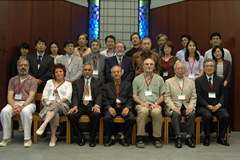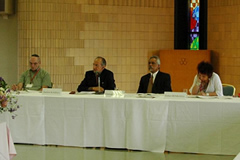Center for Interdisciplinary Study of Monotheistic Religions(CISMOR)Doshisha University
> Past Research Activities > On Dialogue between Islam and Judaism: “Others” and “Ours” in Re-thinkingPast Research Activities
International Workshop 2009
On Dialogue between Islam and Judaism: “Others” and “Ours” in Re-thinking
| Date: |
2009/07/02 14:00 - 18:00 |
|---|---|
| Place: | Neesima Kaikan |
| Speaker: |
|
| Commentator: |
|
| Summary: | |
|
July 2(Thu) The first day of the workshop focused mainly on reports by Prof. Yakov Rabkin and Prof. Hashim Kamali. Both of these reports examined the relationships between Jews and Muslims as “others,” using legal stipulations as a starting point. First, we will look briefly at Prof. Rabkin’s report. According to Prof. Rabkin, past research on Judaism has focused on the perspective of how others have seen Jews, but in recent years, there has been an increase in research from the perspective of how Jews see others. Based on this view, the report examined how Jews’ views of others have been formed and transformed. In the past, Jewish identity took on the characteristics of remoteness and differentiation as a result of the Jewish law Halakha in particular, but in later generations, there were assertions, like those of Emmanuel Levinas, that identity is confirmed by how one responds to the calls of others. Regarding the relationship with Islam, many Jewish scholars see Islam as a strictly monotheistic religion, and point out, for example, that Islam is positioned only slightly differently from the “other” concept of “outsider,” which in practical terms refers to idol worship. Prof. Kamali’s report began by talking about Jews as referred to in the Quran as “people of the book.” In the Quran, Jews are referred to as “Yahud” or the grandchildren of Israel. The priority handling of Judaism compared to other religions is guaranteed in the revelations of the Medina period following Hegirae. To demonstrate this, Prof. Kamali gave the example of the Constitution of Medina, which guarantees freedom of religion for Jews in Muslim nations, and guarantees their social lifestyles in a variety of fields. Considering that after that, many Jews lived in Muslim societies, we can see that the Constitution of Medina held great importance in defining the relationship between Muslims and Jews in the context of social lifestyles. As indicated above, the report covered a wide range of topics including the Quran’s references to Judaism, the Torah, and the Bible, and the relationship between Muslims and Jews as seen in the era of the prophet Mohammed, for which the Constitution of Medina is a representative case. In response to the above two reports, the commentators Prof. Miura and Prof. Nigo presented comparative materials based on historical fact, for example on the problems of translating religious terminology from other religions in translations in modern Iran, and the effects that the medieval philosopher Al-Farabi had on Europe. Prof. Tanaka and Prof. Ichikawa talked about the need to take into consideration the fact that the prophet Mohammed said the Constitution of Medina was a special case; the fundamental relationship between the doctrines discussed in the reports and the radical ideas expressed by some modern Muslims; and realistic approaches to the relationship between Jews and the State of Israel, which is led by a secular government. |
|
|
Program |
|

